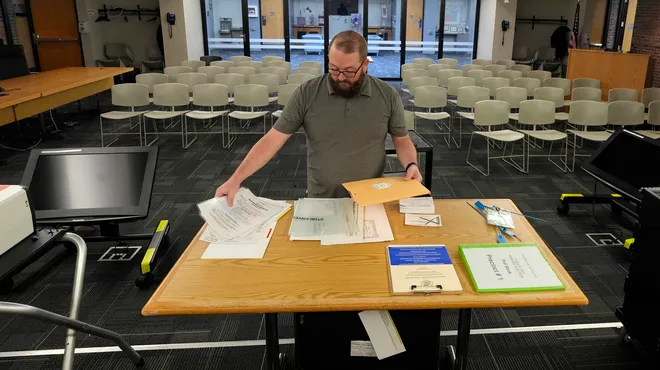
Main|Bio|Books|USA Today columns|Opeds|Boston.com blog|Media|Other Publications| Speaking|Links

Opinion:
Electoral College flawed? So is the National Popular Vote. There's another way.
James Alan Fox
Op-ed contributor
COMMENTARY
Published 6:03 a.m. ET Updated 4:53 p.m. ET
October 28, 2024

With
Election Day approaching, the race for the presidency is remarkably close, often
characterized as a toss-up. General election polls, regardless of whether Vice
President Kamala Harris or former President Donald Trump is shown to be leading,
that advantage is well within the margin of error.
Despite the virtual tie, the Harris campaign characterizes her as the underdog —
and that indeed is the case, because of the unusual method by which U.S.
presidential elections are decided.
In an appearance on HBO’s Real Time with Bill Maher, veteran Democratic
strategist James Carville pointed out the recurring truth that in the existing
landscape, the Electoral College is stacked against Democratic presidential
nominees. “We have to win by three in the popular vote to win the Electoral
College,” Carville said.
The bias exists in the method by which Electoral College votes are awarded to
states — that is, according to size of their Congressional delegations. Votes
for the number of Congressional districts (i.e., members of the House of
Representatives) are apportioned appropriately based on population. But then two
additional Electoral College votes given to each state (for each state's two
senators) unfairly benefit smaller states.
Michigan, for example, is 10 times more populous than South Dakota but has only
five times as many Electoral College votes. A correction of two fewer votes per
state (and Washington D.C.), making electoral vote counts (like House member
counts) proportional to population, would have put Al Gore ahead of George W.
Bush in the 2000 contest 225 v. 211), consistent with the popular vote.
A complicated mechanism, a flawed approach
Equating Electoral College votes to Congressional districts might seem, on the
surface, to suggest that all states could just award their Electoral College
votes district by district — as do Nebraska and Maine. However, that would only
further incentivize gerrymandering in drawing district boundaries.
The two vote state-by-state reduction would not have altered the outcome of the
2016 election, in which Donald Trump received 77 more Electoral College votes
than Hillary Clinton, even though her popular vote total exceeded his by a 2.9
million margin. Under a modified Electoral College system, Clinton would still
have lost, taking 191 votes to Donald Trump’s 245.
But there is another problem. The "winner take all" approach to awarding
Electoral College votes is flawed, as it treats a wide margin in one state the
same as a narrow victory in another. Were the modified Electoral College votes
for each state awarded to each candidate proportionate to state voting results
(and rounding for the sake of simplicity), Clinton would have prevailed over
Trump by 12 electoral votes, 224 v. 212.
One might respond, as many contend, that we should scrap the Electoral College
altogether in favor of the popular vote total. And, in fact, a 224 to 212 doubly
modified Electoral College victory for Clinton, in which she'd accrue 51.3% of
these votes, is virtually identical to her 51.1% edge over Trump in the national
popular vote.
These modifications should not be seen as an automatic advantage for the
Democratic nominee, but instead for the candidate with the greatest support
among voters. In 2004, the last time a Republican won the popular vote, George
W. Bush beat John Kerry in the Electoral College by a 35-vote margin. Under the
modified Electoral College system proposed here, Bush would still have
prevailed, 225 to 211.
Popular vs. population
A 2023 Pew Research Center survey of 8,480 adults found nearly two-thirds of
respondents believed that the Electoral College system should be replaced by the
national popular vote, a level of unhappiness with current process that is as
high as any time since at least 2000, when the divergent results of the
Electoral College and the popular vote was a major topic of discussion.
Despite its appeal in the minds of many, switching to the national popular vote
would carry significant potential problems related to turnout.
For example, even with expanded absentee and early voting options, a significant
number of Michiganders still cast ballots on Election Day. A blizzard in
Michigan’s Upper Peninsula or even a soaking rainstorm in Detroit would suppress
turnout, causing the state to be underrepresented in the national vote total.
Conversely, a hotly contested referendum question in Florida or a gubernatorial
down-ballot contest in New Hampshire would tend to boost voter turnout, causing
state overrepresentation in the national popular vote.
For sake of fairness, states should be represented proportionately to their
populations -- and arguably not just their voter turnout. After all, those who
cannot vote based on youth, infirmity or even institutionalization have a stake
in the outcome. Population, not the popular vote, should rule.
In sum, modifying the Electoral College votes to be proportionate to state
populations and allocating the votes for each state proportional to the voting
results is the best way to ensure a fair voting process. Rather than eliminating
the Electoral College, I say we just change its "curriculum."
James Alan Fox is a Research Professor of
Criminology, Law and Public Policy at Northeastern University.
James Alan Fox
Research Professor of Criminology, Law & Public Policy
Northeastern University
Email: j.fox@northeastern.edu
Web: www.jamesalanfox.com
Member of USA TODAY Board of
Contributors
Mass killing database:
https://masskilling.usatoday.com
James Alan Fox is a criminologist at Northeastern
University and author of Violence and Security on Campus: From Preschool through
College.
He wrote this for The Dallas Morning News.
Website:
https://jamesalanfox.com
Follow him on
Twitter @jamesalanfox
YouTube:
https://www.youtube.com/channel/UChjnRFAoQJt6sQTSRp1uozw
Actual Article Link: Detroit Free Press
https://www.freep.com/story/opinion/contributors/2024/10/28/michigan-electoral-college-national-popular-vote-clinton-trump/75700098007/